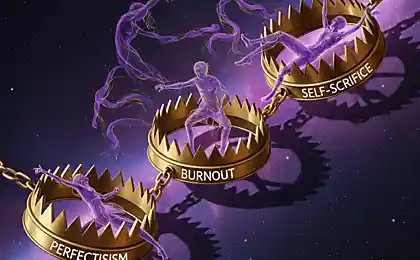964
Emotional burnout

condition when there is no power, no feelings, no joy in life - is the scourge of our time. Fortunately, this can be combated.
Site Tezis.Gumanitarnye discussion published lectures by renowned Austrian psychotherapist the Alfred Langley that kind of symptom, who is to blame and how to live with it. With the permission of the source Website offers it to you, our readers.
Emotional burning (burn-out) - it is a symptom of our time. It is a state of exhaustion, which leads to paralysis of our forces, accompanied by a loss of feeling and joy about life. Nowadays, more frequent cases of burnout. This applies not only to the social professions which burnout was characterized above, and other professions, as well as personal life. The spread of burnout syndrome contributes to our era - the time advances, consumption, the new materialism, entertainment and enjoyment of life. This is the time when we exploit ourselves and allow ourselves to operate.
Easy vygoranieYa think that everyone has ever felt the symptoms of burnout. We find ourselves at the signs of exhaustion when experienced a lot of stress, we realized something big. For example, if we were preparing for exams, working on some project or writing a thesis has two young children. It happens that the work took a lot of stress forces, there were some crisis situations or, for example, during the flu epidemic doctors had to work very hard.
And then there are symptoms such as irritability, lack of desire, sleep disorders (when a person can not fall asleep, or, conversely, sleeps very long time), decreased motivation, people feel mostly uncomfortable, can manifest depressive symptoms. This is a simple version of the burn - burning at the level of the reaction, the physiological and psychological response to excessive stress. When the situation ends, the symptoms disappear on their own. In this case, can help free weekend, time for yourself, dream vacation, sport. If we are not renewable energy through relaxation, the body goes into power saving mode.
In fact, both the body and mind is so constituted that a lot of stress were possible - because people sometimes have to work hard to achieve some big goals. For example, to rescue his family from any troubles. The problem lies elsewhere: if the call does not end, that is, if people really can not relax, constantly in a state of tension, if they constantly feel that they are subject to any requirements, they are always concerned about something, feel fear constantly vigilant against something, something expected, this leads to overstrain of the nervous system in a human muscle strain, there is pain. Some people dream start to gnash their teeth - it can be a symptom of over-voltage.
Chronic vygoranieEsli stress becomes chronic, then burning out the level of frustration.
In 1974, a psychiatrist from New York Freudenberger first published an article about the volunteers who worked in the social sphere in the name of the local church. In this article, he described their situation. These people have symptoms similar to depression. In their history, he showed always the same: first, these people were absolutely delighted by their activities. Then the excitement begins to decrease gradually. And eventually they faded to a "handful of ashes." All of them were found similar symptoms: emotional exhaustion, constant fatigue. At the thought that tomorrow you have to go to work, they have a sense of fatigue. They had a variety of physical complaints, they are often ill. It was one of the groups of symptoms.
With regard to their senses, they no longer have power. What happened was what he called the dehumanization. Changed their attitude towards the people they help: first, it was a loving, attentive, and then it turned into a cynical, rejects negative. Also worsened relations with colleagues, there is a sense of guilt, a desire to get away from it all. They worked less and made all of the template, like robots. That is, these people have not been able, as before, to enter into a relationship and did not aspire to this.

This behavior has a certain logic. If I have no more feelings of strength, then I have no strength to love to listen to other people are for me the load. It feels like I can not meet them, their demands are excessive to me. Then start acting automatic defensive reactions. From the perspective of the mind is very reasonable.
As a third group of symptoms the author found a reduction in performance. People were dissatisfied with their work and their achievements. They experience themselves as powerless, they did not feel that is achieved some success. Total for them was too much. They feel they are not getting the recognition they deserve.
After this study, Freudenberger found that symptoms of burnout do not correlate with the number of working hours. Yes, the more someone works, the more it suffers from its emotional power. Emotional exhaustion increases in proportion to the number of working hours, but two other groups of symptoms - performance and dehumanization, dehumanization of relations - almost not affected. The man continued to be productive for a while. This indicates that the burnout has its own dynamics. It's more than just exhaustion. At this point we still dwell.
Stage vygoraniyaFroydenberger created a scale consisting of 12 stages of burnout. The first stage still looks pretty innocuous:
First, patients with burnout present obsessive desire to assert itself ("I can do anything"), perhaps even in competition with others. Then he begins to neglect their own needs. Man no longer give yourself free time, less involved in sports, he has less time for people to himself, it is less talking with someone. At the next stage man does not have time to resolve conflicts - and so he replaces them, and later even cease to perceive them. He does not see that at work, at home, with friends, there are some problems. He retreats. We see something like a flower that fades more and more. Later lost feelings about themselves. People no longer feel. They're just machines, and can not stop. After a while, they feel empty inside, and if this continues, the increasingly depressed. At last, the twelfth stage, the person is completely broken. He is sick - physically and mentally, experiencing frustration, suicidal thoughts are often present.
One patient came to me with the emotional burnout. He came and sat down in a chair, sighed and said: "I'm glad that I'm here." He looked exhausted. It turned out that he could not even call me to arrange a meeting - his wife dialed phone number. I then asked him over the phone, as it is urgent. He said that urgent. And then I agreed with him about the first meeting on Monday. On the day of the meeting, he admitted: "All the two-day weekend, I could not guarantee that I will not jump out of the window. My condition was so intolerable ».
It was a very successful businessman. His staff about it knew nothing - he was able to conceal from them their condition. And for a long time, he hid it from his wife. At the eleventh stage of his wife he noticed it. He still continued to deny their problem. And only when he could no longer live, already under pressure from the outside, he was ready to do something. That's how far can make burnout. Of course, this is an extreme example.
From enthusiasm to otvrascheniyuChtoby more simple words indicate how emotional burnout manifests itself, you can resort to the description of the German psychologist Matthias Burusho people. He described the four stages.
The first stage looks completely innocuous: it really is not quite burning. This is the stage where you need to be careful. It was then that a man driven by idealism, some ideas, some enthusiasm. But the demands that he constantly makes with himself, are excessive. It requires too much from him for weeks and months. The second step - this depletion: physical, emotional, physical weakness. In the third step usually begin to operate first defensive reactions. What does one do if the requirements are constantly excessive? He goes out of the relationship, there is dehumanization. This is a reaction to counter a defense in order to exhaustion is not getting stronger. Intuitively, a person feels that he needs a rest, and to a lesser extent maintain social relationships. Those relations, which must stay, because without them you can not do, burdened rejection, repulsion.
That is, in principle, is the right response. But one area where the reaction begins to act, is not suitable for this. Rather, the person needs to be relaxed with respect to those requirements that are presented to him. But this he can not - get away from the demands and claims. The fourth stage - this strengthening of what is happening in the third stage, end-stage burnout. Burusho people call it "syndrome of disgust." This concept, which means that the longer a person takes no joy. With regard arises disgust. For example, if I ate rotten fish, I come vomiting, and the next day I hear the smell of fish, I have an aversion. That is the feeling of safety after the poisoning. Reasons vygoraniyaGovorya the reasons generally distinguish three areas. This individual psychological area when a person has a strong desire to give to this stress. The second area - social and psychological or social - is the pressure from the outside: various fashions, some social norms, demands at work, the spirit of the time. For example, it is estimated that each year the need to go on a journey, and if I can not do, then I do not meet people living at that time, their way of life. This pressure can be carried out in a latent form, and it may have the effect of burnout.

More dramatic requirements - is, for example, the demands of prolonged working hours. Today, man transforms and receives no payment for it, and if he does not, he fired. Constant processing - are costs inherent in the capitalist era, in which lives Austria, Germany, and probably also Russia.
So, we have identified two groups of reasons. From the first, we can work in the psychological aspect, in the framework of consultation, and in the second case, you need to change something at the level of political, trade union level.
But there is a third reason, which is related to the organization of systems. If the system provides an individual too little freedom, too little responsibility, if there is mobbing (persecution), then people are very stressful. And then, of course, necessary restructuring of the system. It is necessary to develop the organization in a different way, to enter coaching.
Meaning kupitMy can not confine ourselves to the group of psychological reasons. In the existential analysis, we empirically found that the cause of burnout is the existential vacuum. Emotional burnout may be understood as a special form of existential vacuum. Viktor Frankl described the existential vacuum as suffering from a sense of emptiness and lack of meaning.
A study conducted in Austria, during which the doctor has been tested 271, showed the following results. It was found that those doctors who were meaningful life and not suffer from an existential vacuum, there was little burnout, even if they worked for hours. Those doctors who have detected a relatively high level of existential vacuum in their work, demonstrated high levels of burnout, even if they worked fewer hours.
From this we can conclude that the meaning can not be bought. does nothing to make money, if I'm on my work suffer from the emptiness and lack of meaning
Burnout confronts us with the question: Do I really worry about the meaning of that do? The meaning depends on what we personally feel the value in what we do or not. If we follow the apparent meaning: career, social recognition, love of others, then it is false or apparent meaning. It costs us more strength and causes stress. As a consequence, we have a shortage of execution. Then we experience the devastation - even when relax.
At the other extreme is a way of life, where we are experiencing execution - even if you are tired. Performance, despite being tired, does not lead to burnout.
Summarizing, we can say the following: burnout - is a finite state occurring as a result of the continued creation of something without experience in terms of performance. That is, if what I'm doing, I experience meaning, if I feel that what I do is good, interesting and important if I'm happy and I want it to do it, then there is no burnout. But these feelings are not to be confused with enthusiasm. Enthusiasm necessarily related to the performance - it is more hidden from the other, more modest thing.
What can I give sebyaEsche one aspect, which brings us to the topic of burnout - is motivation. Why did I do something? And as I turned to this? If I can not give my heart to what I'm doing when I'm not interested, I do it for some other reasons, then we are in a sense lie.
It's like as if I was listening to someone, but thinking about something else. That is, if I am not present. But if I am not present at work in my life, then I can not get the same charge for this service. It's not about the money. Yes, of course I can make money, but I, personally, do not receive remuneration. If I do not attend a heart in some case, and use what I do, as a means to achieve the objectives, then I abuse the situation.
For example, can I start a project, because it promises me a lot of money. And I almost can not refuse, and somehow to resist. Thus, we can be tempted by some choice, which then lead us to a burnout. If this happens only once, then maybe it's not so bad. But if it lasts for years, so I just walk "past" of his life. What can I give myself?
And here, by the way, it can be very important that I have a burnout. Because, perhaps, I can not stop myself the direction of its movement. I need that wall, from which I come across some kind of push from the inside, so I just could not keep moving, and has revised its actions.

An example of money, probably the most superficial. Motives can be much deeper. For example, I want to recognize. I need praise from the other. If you do not meet these narcissistic needs, then I become restless. Outside it is not visible - only the people that are close to that person can feel it. But I probably will not even about to talk to them. Or I did not realize that I have such needs.
Or, for example, I definitely need confidence. I have known poverty as a child, I had to continue wearing old clothes. For me it is ridiculed, and I was ashamed. Maybe even my family was starving. I would not never go through this.
I know people who have become very rich. Many of them came to burnout. Because for them it was a primary motive - in any case, to prevent the state of poverty to become poor again. In human terms this is understandable. But it can lead to excessive requirements that will never end.
To the people for a long time we have been willing to follow a seeming, false motivation, their behavior has to be a lack of something, mentally shortage, some trouble. This deficiency leads a person to self-exploitation.
Value zhizniEtot deficiency can not only be subjectively perceived needs but, and attitudes to life, which, ultimately, can lead to burnout.
As I understand it your life?























